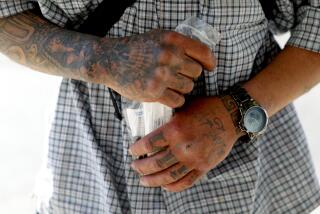Pharmaceutical Firm Will Help Stem Drug Flow
- Share via
A major pharmaceutical wholesaler has agreed to what the state attorney general and Los Angeles city attorney said Tuesday is a unique plan to control excessive sales of certain abused drugs--a particular problem in Southern California.
Amfac Distribution Co., which agreed to the out-of-court settlement without admitting any wrongdoing, will report suspicious orders from pharmacies. It also will pay $200,000--including $90,000 in civil penalties and $60,000 for the cost of the state Board of Pharmacy investigation and the joint court action filed by the state and the city.
In addition, the national wholesaler will give $50,000 to the Los Angeles Drug Abuse Resistance Education Program (DARE), organized by the Los Angeles Police Department and the Los Angeles Unified School District to combat drug experimentation by elementary schoolchildren.
Joint Suit Filed
Atty. Gen. John K. Van de Kamp and City Atty. James K. Hahn said the joint suit against Amfac grew out of an investigation of eight Los Angeles pharmacies by state Board of Pharmacy inspectors in 1983 and 1984.
Four of the pharmacies were served with temporary restraining orders to prohibit illegal drug distribution and the other four were disciplined by the board.
Amfac was alleged to have sold excessive amounts of controlled substances to certain pharmacies, which in turn retailed them for “other than legitimate medical purposes.” Those retail sales were not reported in “a timely manner,” Hahn and Van de Kamp said.
Harry Matte, Amfac’s senior vice president for corporate communications, said in San Francisco the company is “very pleased” with the settlement. “Our biggest concern,” he said, “was to play a positive role in controlling controlled substances . . . keeping them off the street. This is a very positive venture with the attorney general and city attorney.”
Set Up Training Program
Under the agreement, “excessive or suspicious orders” from pharmacies for controlled substances will be “reported promptly” to the state Board of Pharmacy and the board will receive quarterly reports on the sale of unusually large quantities.
A training program also will be set up to make certain that all employees who process wholesale orders know how to tell when an order is excessive.
Van de Kamp said the diversion of prescription drugs has resulted in the illegal distribution “of millions of dollars of addictive and often deadly substances.”
According to the federal Drug Enforcement Administration, the illegal distribution of Preludin, a weight-control drug that prolongs the effects of heroin and other narcotics, is almost entirely centered in the Los Angeles area, where it has a high street value.
The DEA has reported that--as of three years ago, at least--California was third in the nation in the per capita consumption of codeine-based drugs.
“While the per capita distribution of codeine combinations appear to be a statewide problem,” the DEA said in that report, “distribution of Ritalin (an addictive anti-depressant), Dilaudid (an addictive painkiller widely used by heroin addicts) and other substances is significantly higher in Southern California--particularly in Los Angeles.”
More to Read
Sign up for Essential California
The most important California stories and recommendations in your inbox every morning.
You may occasionally receive promotional content from the Los Angeles Times.













